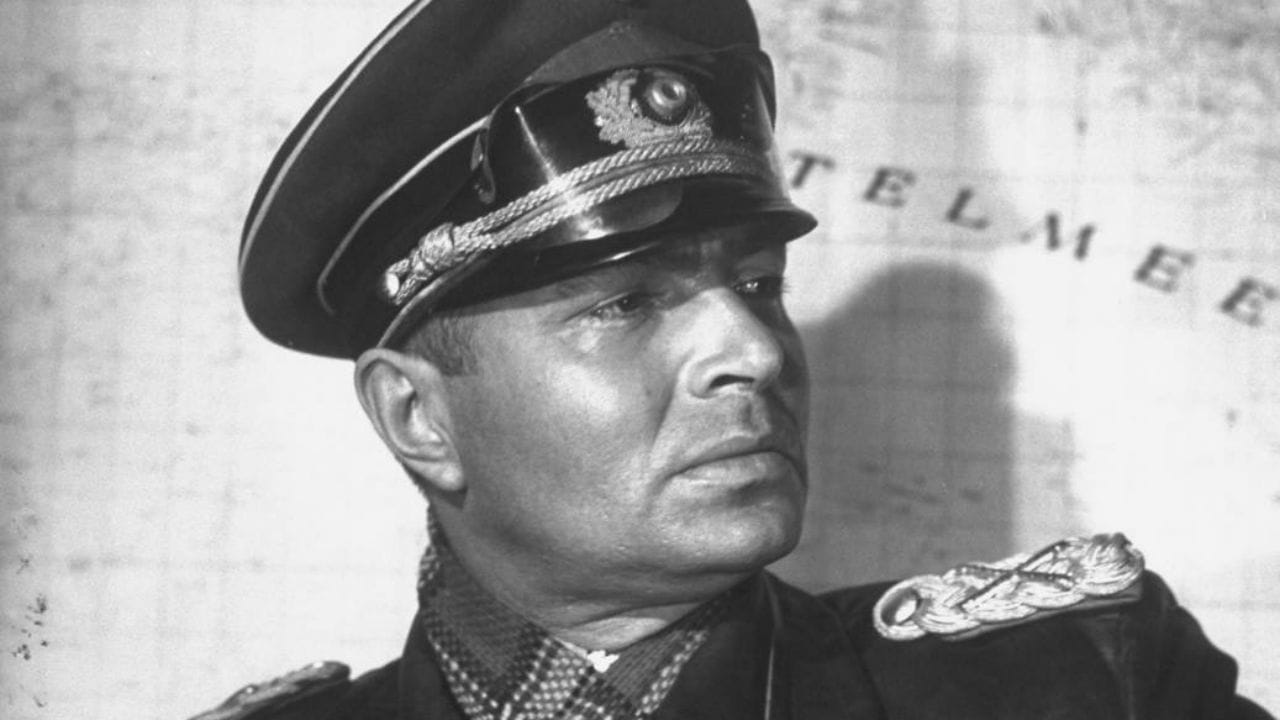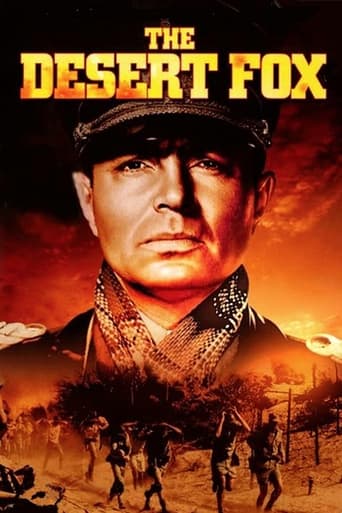Matrixston
Wow! Such a good movie.
SanEat
A film with more than the usual spoiler issues. Talking about it in any detail feels akin to handing you a gift-wrapped present and saying, "I hope you like it -- It's a thriller about a diabolical secret experiment."
Robert Joyner
The plot isn't so bad, but the pace of storytelling is too slow which makes people bored. Certain moments are so obvious and unnecessary for the main plot. I would've fast-forwarded those moments if it was an online streaming. The ending looks like implying a sequel, not sure if this movie will get one
Billy Ollie
Through painfully honest and emotional moments, the movie becomes irresistibly relatable
Leofwine_draca
THE DESERT FOX is a sympathetic biopic of Rommel, one of the great Nazi generals, who led his troops to victory in North Africa before becoming embroiled in one of the most notorious conspiracies of the Second World War. What's apparent from the outset is just how well made this movie is: it's an exemplary piece of story-telling, crisply shot, fast-paced, and with real heart behind it.Much of the film's success is down to James Mason in the titular role. Mason was always a consummate professional and no more so than here; his portrayal of a conflicted figure is an entirely sympathetic one and it's hard to imagine another actor doing so well in the role. The supporting cast is fine, too, but it's Henry Hathaway's direction which really shines. He brings a freshness and vitality even to those moments which are well-known to history, and his film is utterly compelling as a result. Great stuff indeed.
lazyaceuk
With all of the modern re-makes doing the rounds at the moment it is very strange that this story has not been re-worked in any form because the story, as told, is a mess.James Mason, always stoic in the majority of his roles, plays the role of Rommel well enough but he is let down by Hollywood contract players of the time who make no secret of the nation of birth rather the nation of the their roles. Kansas was obviously a suburb of the Rhine.Of most amusement to me was Luther Adler who seems confused as to whether he is meant to playing Hitler or Mussolini.The pacing of the film is also very disjointed. I have no idea as to the whether this is the fault of Nunnally Johnson, the writer, or Henry Hathaway, the director, but as I have seen and enjoyed many of the latters films, I can also assume that the sum of the parts just didn't add up.There is some good stock/news footage within the film, but unfortunately this cannot make up for a poor effort by most of those who have put there names to this highly unassuming experience.
James Hitchcock
"The Desert Fox: The Story of Rommel" is a remarkable film, although not necessarily because of the acting, directing or script. It is remarkable because it is an American biography of a senior German officer, with a predominantly British cast, which takes a sympathetic view of its subject even though it was made in 1951, only six years after the end of the war, and at a time when many Americans and Britons would still have harboured bitter feelings towards all things German, especially that country's military establishment.Despite the title "The Desert Fox", the North Africa campaign of World War II plays a relatively minor role in the film. The battle of El Alamein in 1942 comes surprisingly early in the film and is given surprisingly little emphasis. The film is less about Rommel's career as commander of the Afrika Korps than about his part in the July 20th plot to assassinate Hitler and overthrow the Nazi regime. The Rommel we initially see is an apolitical career officer, neither a Nazi party member nor a convinced anti-Nazi, but after El Alamein and the defeat of the German forces in Africa he gradually becomes disillusioned with the course the war is taking and becomes convinced that Hitler is leading Germany to disaster. Eventually he is persuaded to join the conspiracy by an old friend, Dr. Karl Strölin.This was the first of two films in which James Mason played Rommel; the other was "The Desert Rats" from two years later, and gives a calm and authoritative performance as an honourable commander who is prepared to sacrifice his life in an attempt to free his country from a tyrannical dictatorship. The other performance which stands out is from Luther Adler as a ranting, deranged Hitler, convinced in the face of all the evidence of his own military genius. Adler, incidentally, was Jewish, something which will doubtless cause great annoyance to Hitler should this film ever be shown at the local cinema in Hell. (Mason himself had been a conscientious objector during the war, so it is perhaps ironic that he should have portrayed one of that war's great heroes).The film contains one historical inaccuracy in that it implies that Rommel's superior, Field Marshal Gerd von Rundstedt, was aware of the July 20th plot and wished it well, without actually participating in it. In reality von Rundstedt was outraged by the plot and even served on the "Court of Honour" which tried those plotters who were members of the Wehrmacht. The film also, perhaps, fails to ask awkward questions about whether Rommel and the German Resistance could have done more earlier in the war to oppose Hitler or whether they would have acted in 1944 had the military tide still been running in Germany's favour.Nevertheless, "The Desert Fox" is a good film, a war film which shows that heroic acts can be performed away from the actual battlefield. It also deserves praise for its generous recognition of the facts that honour in war was not the sole prerogative of the Anglo-Americans, that not every German was a Nazi and that our late enemies were also capable of decency and humanity. 7/10
writers_reign
Barely four years earlier (it opened in December, 1947) Jessica Tandy had created the role of Blanche DuBois in A Streetcar Named Desire and had barely ended the Broadway run when she was reduced to a supporting role as Frau Rommel, a role that required little more than passive domesticity and one that any contract player could have undertaken. Not so with the lead; few film actors of the day - Germans excepted, of course - could have brought the gravitas that Mason did to the sympathetic portrayal of a man that audiences were not yet prepared to view sympathetically. At the time the film boasted the longest - approximately one reel - pre-credit sequence of any film made up to that point but overall journeyman director Henry Hathaway turned out a fine film.

